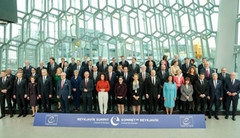EU intends to create two registers of Russia's crimes in Ukraine: economic and military

The main goal of the Council of Europe summit will be to develop legislative and legal mechanisms to bring Russia to justice.
Leaders of 46 countries who gathered on Tuesday for a two-day summit of the Council of Europe intend to create a system that will make it possible to hold Russia accountable for war crimes and destruction in Ukraine. At the meeting in Reykjavik, the participants want to formulate the basic principles of two respective registers. This was reported by the Associated Press.
The main purpose of the Council of Europe summit, the main European human rights organization, will be to develop legislative and legal mechanisms by which Russia should be held accountable for the unleashing of the war of aggression and the consequences of its actions.
Europe hopes that the United States, which is attending the summit as an observer, will support this initiative.
One registry will include all cases of damage caused by Russia to Ukraine, so that in the future it will be possible to claim monetary compensation from Moscow.
As of February 2023, losses from the destruction of infrastructure alone were estimated at $143.8 billion.
In addition, by the end of 2022, at least 109 large and medium-sized enterprises suffered direct losses of $13 billion as a result of the invasion, according to estimates by the Kyiv School of Economics.
In addition, it is planned to keep records of war crimes – this is already being actively pursued by various organizations, from Ukrainian to the UN and the International Criminal Court in The Hague. This is necessary for the tribunal, which will be discussed at the summit.
"I will strongly support the creation of a special tribunal to bring Russia to justice for the crime of aggression," said European Commission President Ursula von der Leyen.
Background. As a reminder, in February, it was announced that an international centre would be established in The Hague to coordinate the collection of evidence for the purpose of prosecuting Russia for the crime of aggression.

Denys Shmyhal: Creation of a register of damages caused by russian aggression will allow to start the process of establishing justice
The creation of an international register of damages caused by the aggression of the russian federation against Ukraine will help to start the process of establishing justice. This was emphasised by Prime Minister of Ukraine Denys Shmyhal in his speech at the roundtable “Support for Ukraine – Solidarity and Responsibility” at the 4th Summit of Heads of State and Government of the Council of Europe.
“The decision to create the Register, which we expect to be taken at the highest international level at this Summit, will be historic without exaggeration. At the same time, it is only the first step towards the creation of a comprehensive international compensation mechanism. Now we must focus our efforts on establishing the Compensation Commission and the Compensation Fund, which will allow us to begin the process of compensating all victims of russian aggression,” said Denys Shmyhal.
The Head of Ukrainian Government also called on the Council of Europe’s member and observer states to support the idea of establishing a special international tribunal for the crime of aggression, saying it was important to bring russia’s political and military leadership to justice.
“Only by bringing the aggressor to justice will Europe be able to prevent bloody wars on the continent,” the Prime Minister of Ukraine stressed.
Denys Shmyhal also noted that nuclear blackmail, the seizure of the Zaporizhzhia Nuclear Power Plant, and the unleashing of a full-scale war in the centre of Europe were incompatible with the status of the russian federation as a permanent member of the UN Security Council, which it enjoyed without proper legal grounds: “It is absurd that the aggressor state presides over the UN Security Council. Such a post-war international security system, created after the Second World War, does not correspond to modern realities and requires urgent and substantial reform.”

IC UAC according to Mind.ua and the Communications Department of the Secretariat of the CMU
- 2031 reads





